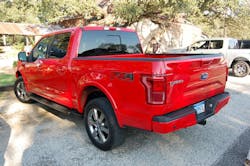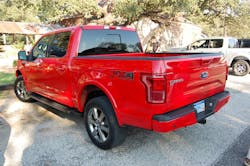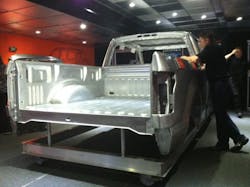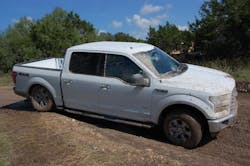Now, Ford’s decision to switch from steel to aluminum for its F-150 body is not a sure slam dunk – indeed, this article from the investment firm Motley Fool lays out some of the potential pitfalls an all-aluminum body could pose for pickup owners.
Yet in some ways Ford – and every other light truck maker, for that matter – is being forced to engage in such radical design efforts due to higher corporate average fuel economy (CAFÉ) rules put in place by the federal government three years ago.
[That includes building smaller yet more powerful engines, as this story explains.]
I talked with Jerry Farrell, Ford’s chief program manager for trucks in North America, about that very issue and he confirmed that the new CAFÉ standards is what helped the OEM finally “pull the trigger” on its switch to aluminum for the 2015 model F-150.
“We started working on this new truck four years ago there were times when we hit a design roadblock that many of us would say, ‘that’s it; we’re going back to steel!’” he told me. “I can’t put into words just how much effort it required at times to keep moving forward with aluminum.”But Farrell stressed that, looking 15 years out in terms of CAFÉ and customer demands for better fuel economy, ultimately convinced Ford to stick firmly to its aluminum “glide path.” Indeed, Ford plans to eventually switch to aluminum for its Super Duty F-250 and F-350 trucks as well.
“It’s our foundation strategy for achieving regulatory compliance and meeting customer needs,” he explained. “Aluminum actually beats steel in weight, strength, and corrosion resistance. Only cost is where steel beats aluminum.”
Farrell added, too, that another reason driving the switch to aluminum is to give Ford’s full-size F-150 more “compact pickup” characteristics – helping the F-150 fill the hole left when Ford discontinued its Ranger pickup back in 2011.
“Back when fuel prices were rising fast [in the U.S.], our Ranger sales volumes kept declining – they were getting so low it wasn’t a good fit for our truck portfolio anymore,” he said.
“Now, by providing such a light architecture for the F-150, we’re offering a vehicle and can haul and tow more, yet provide the fuel economy more typically found in a mid-size or compact pickup,” Farrell noted.“That’s why we think [the new 2015] F-150 will help us recapture some of the Ranger market and compete well with the new Chevrolet Colorado and GMC Canyon,” he added.
[All that being said, Ford IS thinking about re-introducing a compact pickup model; though it won’t be the Ranger.]
The funny thing about all of this, though, is it’s just the beginning of big changes in the light truck arena. Indeed, Farrell noted that Ford is already now six months into the next F-150 program – one poised to build further on the 2015 model’s aluminum platform.
“The only real reason no one’s gone to an all-aluminum [light truck] body before is that there’s been no high volume history for it,” he emphasized. “Now we have.”
It will be very interesting, then, to see what comes next.



